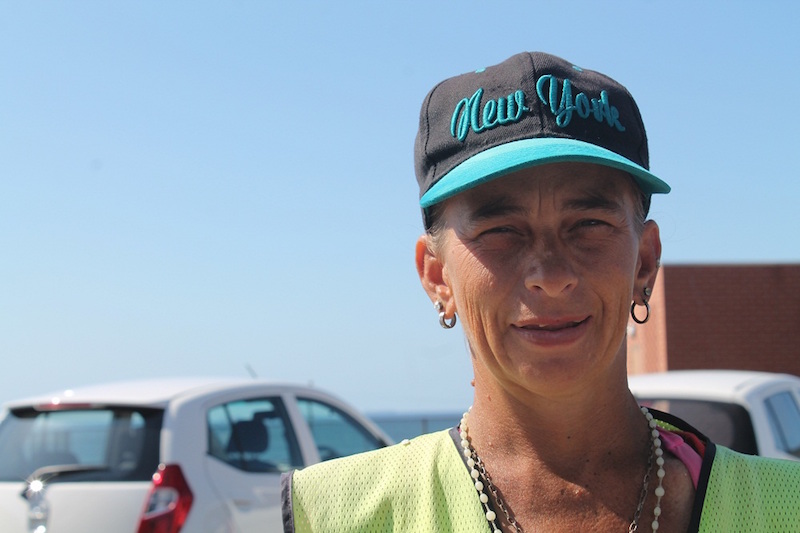Car guards, who in most cases are black and male, can be found in almost every public parking lot in South African cities. Qiniso Mbili spoke to MARY WALTER, a white female car guard at Durban’s South Beach, to find out how she ended up guarding cars on the side of the road.
This is a hard job but I can’t complain. Life itself is even harder.
I don’t like being a car guard. If you had told me a year ago that I would ever be a car guard I would have laughed at you so hard. This is a hard job, but I can’t complain. Life is even harder.
Some people acknowledge the job of a car guard, but some just think we are glorified beggars and those are the ones that make life hard. It is especially hard for a woman because verbal abuse is guaranteed from at least one drunk driver during the weekends. In the past week I’ve had to take abuse from a male car guard who has been trying to chase me away so he could take my spot. He would come by swearing at me and saying that this is not a women’s thing.
A year ago I was a receptionist at a law firm in Johannesburg, married and living a normal life with a beautiful family. I am now divorced, homeless and unemployed. This is my sixth month as a car guard now. I don’t have a formal place to stay; I sleep at a rented shelter with my 15-year-old son.
We got a new boss at the law firm. One day during an altercation with the boss, I quit and that was it. This was just the beginning of my problems.
My husband started drinking heavily and getting abusive towards me and the children. He had a history of aggressiveness but nothing like what he was after I quit my job. He believed that I shouldn’t have quit the job because I hadn’t discussed my decision with him beforehand.
Three months after my resignation I filed for divorce after one of his violent episodes. I still believe that had I stayed a week longer in that house, he would have killed me. Every physical assault was worse than the last.
I don’t have a good relationship with my mother; I couldn’t ask for her help or stay with her. She always took my husband’s side.
I had a bit of savings in my account and I decided to come to Durban to change the scene, get a new job and a new, happier life. I brought one of my four children with me and had planned to try and fetch the girls later. My son is 15 years old and is currently not going to school because we arrived in Durban during the mid-year.
It is devastating to struggle like this when I have someone to support. At the shelter, I have to pay R100 per night for a single bed which I share with my son. They give us one meal at night and they close during the day. My son then goes to beg in various parts of town during the day in order to help me come up with money for food and the shelter. On bad days I can’t even come up with R100 for the shelter, I then have to go begging during the night until I have enough money.
My phone got stolen during my first week at the shelter. This made job hunting very hard. I have a matric certificate and a CV. I sometimes go look for jobs, but I always have to try and speak to the potential employers right there and then since I don’t have a phone for them to contact me. I have to do this in between car guarding so that I can get enough money for the shelter. It is easy to lose your car guarding spot if you are not there most of the time.
There is nothing that I wish for more than getting a job and getting out of here. What people don’t know is that it is very hard for a homeless, white person to get an office work job. As a homeless person, employers don’t take you seriously.
I really hope that this is just a passing phase; I would love to see myself working again and living with all my children. The only thing that makes me feel good about myself these days are the drivers that acknowledge my job and trust me with their cars.

![Mary Walter car guard on street [slider]](https://www.thedailyvox.co.za/wp-content/uploads/2015/05/Mary-Walter-car-guard-on-street-slider.jpg)








